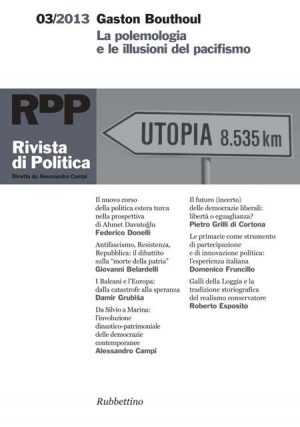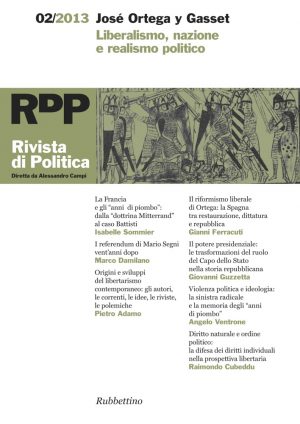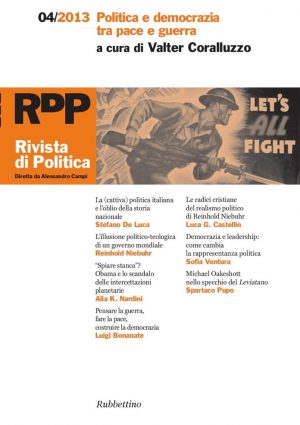01/2013 – Leo Strauss. «Dobbiamo scegliere tra la filosofia e la Bibbia»
ISSN: 2037-495X
8,50€ – 11,00€
Descrizione
Sommario:
congetture e confutazioni
Numeri (pochi), bugie (tante) e videotape. La più brutta campagna elettorale della storia repubblicana? Fabio Martini
Caccia al voto (in rete). La campagna elettorale 2013 tra Twitter e Facebook Gianluca Sgueo
Lo zar del mondo G-Zero. Dalla Russia la salvezza? Roberto Valle
Obama alla prova della storia. Le prospettive del suo secondo mandato Alia K. Nardini
Dopo Benedetto XVI. Le contraddizioni della Chiesa e le sue sfide future Luca Ozzano
Perché non siamo (ancora) «normali»? Intorno a Il paese reale di Guido Crainz Damiano Palano
l’inedito
Tra Gerusalemme e Atene. Politica, scienza, eternità nella lezione di Leo Strauss Giulio De Ligio
Che cosa possiamo imparare dalla teoria politica? Leo Strauss
pensare la politica
Ragioni e azioni comuni
La responsabilità della ragione. Tocqueville e il problema della trascendenza moderna Ralph C. Hancock
La volpe e il leone. L’astuzia e la forza nel discorso della guerra Jean-Vincent Holeindre
Dalla politica del riconoscimento alla politica dell’amicizia. Qualche considerazione sull’amicizia civica in Aristotele Adrien Louis
memoria e storia
Il racconto della violenza e del terrorismo
L’immagine del terrorismo nel cinema italiano Christian Uva
Il racconto degli anni di piombo sulla stampa quotidiana nazionale (1996-2010) Luca Falciola La memorialistica della destra radicale Ugo Maria Tassinari
La memoria dopo il silenzio. Gli scritti delle vittime e dei famigliari delle vittime Agnese Moro
saggi
Iraq 2003: la guerra di Bush o una guerra americana? Corrado Stefanachi
Se la democrazia finisce nella rete. Le opportunità (poche) e i rischi (molti) Andrea Ferrazzi
Abstracts
Giulio De Ligio, Athens and Jerusalem. Politics, science, eternity in the lessons of Leo Strauss
This essay’s aim is to present the main themes and moments of Leo Strauss’s life and works. It outlines how Strauss addressed the crisis of our time (which he considered to be coextensive with the crisis of modern rationalism). It also analyses which arguments and studies made him reconsider both the political latitude (or actual seriousness) and the enduring significance of man’s permanent and fundamental problems. In particular, the essay illustrates how Strauss came to articulate the very relationship between political life, whose actions and opinions have for him an inner directedness towards the question of justice, and the alternative between the biblical and the philosophical responses to the same question. It then attempts to account for the overall implications of Strauss’s effort to revive political philosophy. Most notably, what appears as a profound understanding of the twin dangers facing modern man: irresponsible indifference to politics and irresponsible political options, or estrangement from the issue of good society and the oblivion of eternity. Finally, the essay provides Strauss’s perspective how modern doctrines and institutions have failed to provide a solution to political issues as well as to the primary human problems addressed by his belief.
Leo Strauss, What Can We Learn from Political Theory?
In this lecture held in July 1942 at the New School for Social Research in New York, Leo Strauss outlines the main features of his renowned understanding regarding the necessary recovery of political philosophy. He discusses the arguments, both positive and negative, concerning the possibility for human beings and statesmen to learn something from political philosophy. To do so, he presents the classical interpretation of the difference between practical and theoretical sciences and then articulates what can be seen as his most elaborate statement on the relation of political philosophy and political practice. Finally, Strauss sketches two major themes of his work. On the one hand, the difference between legitimate utopianism of ancient political philosophy and spurious utopianism of modern political philosophy. On the other, the fundament alternative between philosophy and the Bible.
Ralph C. Hancock, The Responsibility of Reason. Tocqueville and the problem of modern transcendence
Alexis de Tocqueville (1805-1859) has been generally regarded as a leading historian and pioneer of political sociology. His contribution to philosophy has, however, been somewhat neglected. The article aims to highlight the depth and originality of his critique of modern rationalism. His works owe him a place beside the greatest philosophers in western tradition. Indeed, unlike Plato, Martin Heidegger and Leo Strauss, Tocqueville’s challenge to the ruinous separation/fusion of theory and practice is still a viable theoretical option in the contemporary context.
Jean-Vincent Holeindre, The Fox and the Lion. Cunning and strength in the speech of war
Despite its current use in political debate, cunning unlike the concept of strength, has never been the subject of academic study. Greek military culture was fuelled by the constant tension between the mètis of the strategists and the strength of the hoplites. Roman law introduced a theoretical sublimation of the quality of cunning which then continued in theological and moral circles within the great monotheist religions of Judaism and Christianity. In the modern era, Machiavelli alone succeeded in overcoming the limitations set by Christian writers inspired by Roman doctrine (first and foremost by Ambrose and Augustine). Force and cunning suddenly became tools for understanding political dynamics as a whole. In this way, he indirectly contributed to enhanced knowledge of current warfare and present-day military strategy, characterized by an upsurge of terrorism and asymmetrical military confrontation.
Adrien Louis, From the Politics of Recognition to the Politics of Friendship. Brief remarks on civic friendship in Aristotle
Present liberal societies appear more and more heterogeneous due to the emergence of new social and cultural groups. In this context, governments seem to have no other choice but to either exclude social and cultural particularities in the name of the nation or systematically recognize them in the name of toleration. But is this alternative inevitable? Aristotle’s theory of Civic Friendship can help us better answer this question.
According to Aristotle, this type of friendship has a social base. It is founded on the existence of a strong middle class. This conception is, however, above all else political. Civic friendship requires common deliberation and consensus on what is good for the City itself. Today, this condition could be obeyed if the diverse social groups involved were able to clearly express what they want, not only for themselves but for society as a whole.
Christian Uva, The Image of Terrorism in Italian Cinema
In recent decades, the Italian film industry has attempted to reproduce something Italian society has not yet been able to fully absorb. However, the cinematic portrayal of the anni di piombo (literally «Years of Lead» which refer terrorism in Italy in the 1970s and early 1980s) coincides with a heterogeneous corpus comprised of many insightful clips and fragments. Nevertheless, no single film has thus far been able to concentrate all the characteristics of the cinematic model on terrorism. That is why a composite, structured and exhaustive analysis on this topic can only emerge via consideration of the disparate available filmography.
Luca Falciola, An Account of the «Years of Lead» through Italian Daily Press (1996-2010)
Recollection of the political violence experienced by Italy during the so-called «Years of Lead» is still highly controversial and unsettled. The mainstream media account of this period is considered as one of the main sources of such pathology of memory. Treatment of this sensitive topic by Italian newspapers has been labeled as superficial, ideologically biased and selective in the use of testimonies (obliterating the victims’ point of view). This research aims at verifying these assumptions. To fully address this question, the essay follows two main criteria. Firstly, a data set drawn from the digital archives of the two most widespread Italian daily newspapers: «Corriere della Sera» and «La Repubblica». Secondly, a wide temporal window encompassing a fifteen year period between 1996 and 2010. This time frame allows a longitudinal analysis and offers a distant perspective from the 1970s which in turn allows scrutiny of the revision of the accounts of those years. Based on extensive qualitative and quantitative evidence, the essay proposes that the two newspapers – contrary to conventional belief – provided a fairly accurate, balanced and contextualized account of the «Years of Lead».
Ugo Maria Tassinari, Recollections of the Radical Right
In Italian left-wing terrorism, historic truth and courtroom truth do not coincide. Until very recently, legal proceedings were blind to impartial research. Thanks to a handful of journalists and growing publication of memoirs and autobiographies a substantial amount of fist-hand oral and written testimony has been collected. The role played by the far and radical right-wing during the so-called «years of lead» can now be told.
Agnese Moro, Memory After Silence. The works of victims and their relatives
Until very recently, victims’ voices and memoirs have been systematically underrepresented. On the contrary, extreme left-wing testimonies and judicial issues have received much wider attention. Said disparity is, however, now changing.
Books and publications by victims of terrorism and their relatives (the essay examine exactly this actually extended material), as well as reconciliation policies promoted by the current President of Italy, Giorgio Napolitano, have provided Italians with a different and less partial historical review of the so-called «Years of Lead».
Corrado Stefanachi, Iraq 2003: Bush’s war or an American war?
The 2003 Iraq war is still widely characterized by scholars and pundits as a revolution of US policy in the Persian Gulf. As an abrupt shift from containment to regime-change which bears the unmistakable mark of the Bush administration. This article argues that this characterization is to some extent inaccurate and also misleading. To begin with, the emphasis on the Bush revolution tends to lose sight of the fact that Clinton’s policy towards Iraq has never been one of pure containment and should be depicted instead as one of containment-plus (i.e. containment with some elements of indirect rollback). Furthermore, the Bush revolution assumption fails to grasp the extent with which the decision to escalate the longstanding conflict with Saddam Hussein in 2003 came out of geopolitical considerations which were widely shared in Washington, and indeed well beyond the incumbent administration. From 1998-99 onward, consensus formed in Washington which believed the so-called containment policy not to be indefinitely prolongable. While this policy seemed to provide no reliable solution to the problem of Iraqi alleged proliferation of weapons of mass destruction, the outrage generated in Arab countries by elements of the containment policy such as economic sanctions against Iraq and the presence of American troops in Saudi Arabia was deemed to pose an increasing threat to the regional stability. That threat needed to be averted through removal of Saddam Hussein.
Andrea Ferrazzi, If Democracy Appears on the Internet. (Few) Opportunities and (many) risks
Can the web contribute towards improving the health of democracy? Internet’s proponents believe so. However, a more critical approach highlights some fundamental problems. Firstly, the combination of polarisation and fragmentation, typical of web-based participation, could bring an end public debate. Secondly, internet produces an information overload that impacts upon the minds of individuals and public opinion in general. Thirdly, the web’s potential to transmit and propagate emotions (albeit constituent elements of any political discourse) implies exasperating the tone of populist politics.






